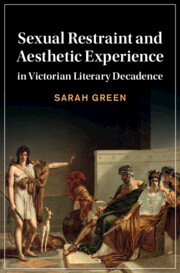Book contents
- Sexual Restraint and Aesthetic Experience in Victorian Literary Decadence
- Cambridge Studies in Nineteenth-Century Literature and Culture
- Sexual Restraint and Aesthetic Experience in Victorian Literary Decadence
- Copyright page
- Contents
- Acknowledgements
- Introduction
- 1 Loss and Gain
- 2 ‘A Passionate Coldness’
- 3 ‘A Holy Indifference and Tolerant Favour’
- 4 ‘An Ascetic Epicureanism’
- 5 ‘Men Have Died of Love’
- Conclusion
- Notes
- Bibliography
- Index
- Cambridge Studies in Nineteenth-Century
3 - ‘A Holy Indifference and Tolerant Favour’
Lionel Johnson
Published online by Cambridge University Press: 02 March 2023
- Sexual Restraint and Aesthetic Experience in Victorian Literary Decadence
- Cambridge Studies in Nineteenth-Century Literature and Culture
- Sexual Restraint and Aesthetic Experience in Victorian Literary Decadence
- Copyright page
- Contents
- Acknowledgements
- Introduction
- 1 Loss and Gain
- 2 ‘A Passionate Coldness’
- 3 ‘A Holy Indifference and Tolerant Favour’
- 4 ‘An Ascetic Epicureanism’
- 5 ‘Men Have Died of Love’
- Conclusion
- Notes
- Bibliography
- Index
- Cambridge Studies in Nineteenth-Century
Summary
Lionel Johnson is more famous now for his life (and death) than his work – for his alcoholism and insomnia, conversion to Catholicism, erroneous claims to Irish heritage, and death by severe brain haemorrhage at the age of thirty-five. As a founding member of the Rhymers’ Club and contributor to the notorious Yellow Book, he is frequently referred to as a major figure of British Decadence, but his work is rarely considered in any detail. This chapter looks at Johnson’s criticism, poetry, and letters as expressive of a religious humanism heavily influenced by Pater’s sensuously continent aestheticism. No one was more excited by the world than Johnson, by the crowds of London as much as by the wonders of nature, and the continence he described was hardly a cloistered retreat. But sex was at the heart of what he saw as wrong in the modern world: its lack of respect for tradition; its bad manners; the haste that led people to look to their own uncultivated selves for a guide to right and wrong. Like Pater, Johnson portrayed continence as a sociable practice, leading to better relationships with people, objects, and the past.
- Type
- Chapter
- Information
- Publisher: Cambridge University PressPrint publication year: 2023

